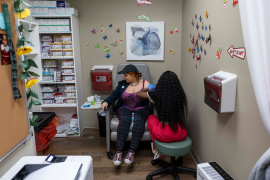Despite significant growth in the National Institutes of Health (NIH) budget, new analyses have found that medical schools and teaching hospitals in highly competitive markets are experiencing difficulty in conducting research and securing federal research grants. A study in the March 24 issue of the Journal of the American Medical Association shows that medical schools and teaching hospitals, known as academic health centers (AHCs), in highly competitive markets have fewer discretionary funds to support research than their counterparts in markets not dominated by managed care. In fact, internal funding for research was almost twice as high for AHCs in less competitive markets such as Chicago or Atlanta (6.1 percent of total funds) than it was in more competitive markets such as Minneapolis–St. Paul or San Diego (2.5 percent of total funds). The study indicates that this discrepancy is cause for concern given that many researchers are highly dependent on internal funding for their work. The study, conducted by researchers at Massachusetts General Hospital and Harvard Medical School, is the first of its kind to assess how market competition is affecting the ability of medical school faculty to conduct research. The researchers surveyed more than 2,000 medical school faculty to assess how many relied on unsponsored funds, or research not supported by the federal government or industry, to conduct research. For the purpose of the study, unsponsored research was defined as research relying on surplus clinical revenues, funds from group practices, unexpended grant funds, or any uncompensated time on the part of the researcher. "As competition in health care markets continues to grow, more medical schools and teaching hospitals are going to find it harder to compete, and that means they are going to have less money to fund research on their own," says lead study author Joel Weissman, assistant professor at Harvard Medical School and a senior scientist at the Institute for Health Policy at Massachusetts General Hospital. "Medical schools and teaching hospitals are the engine of biomedical research for the entire world. If their research funds dry up, then we all lose." According to the study, almost three-quarters of medical school faculty performed unsponsored research in 1996, and almost half relied on institutional funding, such as clinical subsidies or revenues, for some of their research. Fifty-five percent engaged in faculty-supported research, meaning they used their own clinical income or worked extra uncompensated hours. The study also notes that unsponsored research is extremely important to future research. "Unsponsored research plays an important role in the investigative process by developing nascent ideas into more fully developed proposals that later generate external support," notes study co-author Eric Campbell, an instructor at Harvard Medical School. "In many cases, unsponsored research leads to published papers or patents, significantly increasing medical knowledge." The study estimated that medical school research faculty received $375 million in institutional funding for the direct costs of their research in 1996. A detailed analysis of the flow of funds within six AHCs found that clinical enterprises generated an average of about $50 million per year that the facilities used to subsidize academic activities such as research. This amount represented 4.4 percent of an estimated $8.5 billion in total direct costs for research by medical faculty. Other results showed that the proportion of direct cost research supported by institutional funds was smaller in more competitive markets. Task Force Recommends Increased NIH Support and Improved AHC Management to Respond to Health System Changes Threatening Research Mission According to a new report released today, projected increases in the NIH budget will not alleviate problems affecting biomedical research at AHCs. The report, From Bench to Bedside: Preserving the Research Mission of Academic Health Centers, by The Commonwealth Fund Task Force on Academic Health Centers (see list of members), maintains that the competitive market pressures of managed care have eroded the ability of AHCs to subsidize research from their clinical revenues and other internal resources. The problem is exacerbated by lack of adequate support from NIH grants for the direct and indirect costs of research. AHCs typically have used internal funds to subsidize academic activities such as research and to leverage loans to build space to accommodate significant NIH-supported research. The report finds, however, that for AHCs in highly competitive managed care markets, resources available to cross-subsidize such activities and grants are dwindling. The task force, chaired by Samuel O. Thier, M.D., chief executive officer of Partners HealthCare System, Inc., and directed by David Blumenthal, M.D., of Massachusetts General Hospital, also notes that if AHCs expect to receive greater public support for their research activities, "they have an obligation to use that support with maximum efficiency and effectiveness." The report also suggests that AHCs take more steps to address problems in managing their clinical research, and recommends that institutions find more innovative ways to re-engineer systems that support research to improve efficiency and reduce costs. In addition, the report maintains that AHCs should develop policies and procedures to guide faculty in their efforts to attract new clinical research to their institutions. One of the most significant challenges facing AHCs, say the authors, is deciding the types of trials that are most appropriate for them. The report offers several recommendations to counteract the effects of managed care competition and ensure the continuation of the research mission of AHCs, including:
- AHCs should improve the management of both their clinical and basic research enterprises.
- AHCs should work to increase the dissemination of new and emerging cost-reducing technologies and to improve the delivery of health care services.
- The NIH should provide appropriate amounts of support to cover construction and renovation of research facilities through explicit capital support and the restoration of the federal Biomedical Research Support Grant.
- NIH contribution to indirect costs should be maintained at no less than current levels to support the real costs of conducting research and maintaining investigators' laboratories and offices.
- Support should be increased for clinical research and the training of clinical researchers at AHCs.
- Increased federal support should be allocated for health services research on costs, quality, and access issues.


